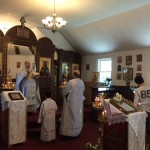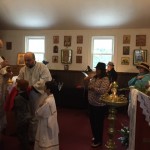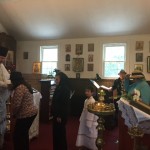On May 24, on the Sunday of the Holy Fathers of the I Ecumenical Council, we held a beautiful liturgical celebration at St. George Church. On that day we also celebrated feast of St. Cyril and Methodius, holy equal to the Apostles teachers of Slavs. Our Rector, Archpriest Igor Tarasov served the Divine Liturgy. After the Gospel readings he preached a homily:
“These days after the feast of the Ascension we come to celebrate Sunday of the Holy Fathers of the First Ecumenical Council of Nicaea. This first large gathering of the bishops of the universal Church took place in the 4th century. The most important document issued by these Holy Fathers was the Nicene Creed, a greater part of the Creed we recite today at our Liturgy. The Nicene Creed contains the truths of our faith: it declares what we believe in. The Church wishes us to commemorate those Fathers today because we are now going through the celebration of the Ascension of the Lord into heaven. Jesus has ascended into His Father’s house in order to prepare there a place for us. Heaven is eternal life. This life is expecting us. But it is not an automatic reward.”
“In today’s Gospel reading our Lord Jesus Christ pronounces His Pontifical Prayer, a prayer to God the Father performed by Jesus as the High Priest. As a High Priest the Lord is praying for His Disciples asking that they may have the gift of eternal life. He further explains that eternal life is “that they may know You, the only true God, and Jesus Christ whom You have sent” (Jn. 17, 3). Thus to have eternal life means to know the only true God and His Jesus Christ whom He sent. What kind of knowledge is that? The knowledge of God goes far beyond rational or academic pursuit. Many people may study Christian doctrine, even Theology, but may not have the true knowledge of God. Knowledge of true God is a participation in divine life in communion with God. It is an ongoing, loving knowledge of God in Christ. It is sometimes very intangible and not easy to grasp. But it is also very easily distinguished in the holy lives of the Saints. If you examine their lives you will learn about knowledge of God they had. It can be easily recognized as living according to the Christian commandments.”
“Many other people in the history failed to have this knowledge of God. First people knew God, but when they agreed to commit a sin of disobedience, it seemed that they lost that knowledge. After Jesus Christ came to redeem the human race, the Jews could not recognize God in Him. Later many Gentiles who listened to the preaching of the Apostles were not able to grasp the idea of God being human and crucified. Therefore St. Paul had to say: “We preach Christ the crucified, to the Jews a stumbling block and to the Greeks foolishness” (1 Cor. 1, 23). Different false teachings, religions and cults lacked that knowledge.”
“Today we also honor St. Cyril and Methodius, the holy equal to the Apostles teachers of Slavs. They were preaching Christian faith to the Slavic tribes living in Eastern Europe in the 9th century. Some of those tribes are our ancestors, and nine centuries after Christ they had no knowledge of true God. They could not attain eternal life. St. Cyril and Methodius, the two Greek missionaries, helped the Slavs to embrace Christianity and to understand it in their own native language. This is why those two brothers from the city of Thessalonica studied Slavic dialects and invented an alphabet to be used by the Slavs. They also performed a great labor by translating the Scripture and liturgical services into Slavonic language, so the first Slavic Christians could have their own books in their own tongue. Thanks to those great Saints we have a huge cultural and religious heritage, especially preserved in our Russian Orthodox Church. St. Cyril and Methodius founded a separate Slavic Christian civilization which embraced several Eastern European nations. Thus these two holy men and their works have a tremendous significance. And the most important and precious result of their life and work was to make the Slavic nations to know the only true God, and Jesus Christ whom He sent. The most precious for us is that because of their labors we may have eternal life in Christ.”
“Therefore, dear brothers and sisters, let us pursue the gift of eternal life which consists of knowledge of God and His Son, Jesus Christ, God and Man. Let us cherish and acquire that knowledge, an intimate and loving experience of the true God manifesting itself in the holy life according to the teaching of the Holy Gospel. Let us be worthy of heaven prepared for us.”
After the dismissal of the Liturgy the Rector proclaimed traditional Polychronion (“Mnogaia leta”) to His Holiness, Patriarch Kirill who celebrates his name day on this feast.



